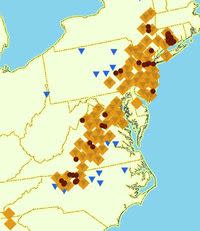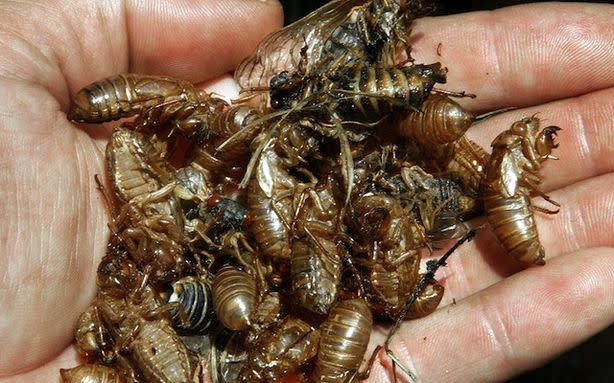Everything You Need to Know About the Impending Cicada Sex Invasion
Perhaps you've heard about the thousands of cicadas that are preparing to take over the East Coast with a "frenzy of sex and death." Perhaps you're not really sure how intense the Insect Spring will become. We're here to help. The extremely noisy bugs are coming for what some have called the Super Bowl of cicada mating season, and they are due to arrive, up and out of your trees and with the sexual sounds of a power saw, sometime very soon. It's not clear exactly when or exactly where they will hit, but for the first time in 17 years, billions of this particular brood will descend upon the mid-Atlantic region for the sole purpose of making cicada babies—and then dying. It's either a gross or fascinating phenomenon, depending on your bug persuasion. In any case, it's an event millions of people need to prepare for—at least for the purposes of cocktail party conversation. Here's an illustrated entomological guide.
RELATED: Bruce Springsteen Wants to Sweat Like a Dog; Liam Neeson Gets It
It seems like the cicada hype is bigger than usual. How are this year's cicadas different from all other cicadas?
RELATED: Mutton Parts, Randy Cartoonists, and Expensive Taste
While other broods come up more often, this type, called Periodical Cicadas, only come up once every 17 years. These guys are worse than 2004's so-called Brood X, and they haven't seen the light of day around the populated U.S. since 1996... and we won't see them again for another 17 years after that. So: Billions of bugs that have been feeding off of tree roots underground will suddenly appear. This will be an event.
RELATED: Staying in a Good Mood; Drinking a Bit More
Gah! Is there a chance the bugs come to a neighborhood near me?
RELATED: 19,000 New Species; The Choking Game Trend
If you live in a state on the Eastern seaboard from North Carolina to Connecticut, there is a very high likelihood that you will experience the cicadas. The bugs come out in what are called broods, and this year it's the East Coast group, Brood 2, that's coming out to annoy the hell out of you.
RELATED: Emotional Computers; Parents Don't Know Where Their Kids Are
Okay, but are they going to come to my backyard?
Some areas might not see any cicadas, while others could see millions—even billions—per acre. They come up out of the trees, so people who live in the concrete jungles along the coast, will likely not see these guys hanging out around their stoops. Otherwise, it's hard to tell where exactly they will congregate. The map to the left, based on historical data from Magicada.org suggests they will be basically everywhere, though. For more specific intel, Cicada Mania, a website dedicated to all things cicadas, suggests asking people who were around those neighborhoods 17 years ago what the situation was like. Or you can check this database for historical information on which counties saw Brood 2.
That doesn't really make me feel better. Are there physical signs of the coming bugpocalypse?
If you're the explorer type, take a walk around the yard to look for these "cicada turrets," which the insects build as a gateway from their normal underground habits to our world. Otherwise, you can expect them to emerge within the next few weeks.
"Next few weeks," huh? Is there an exact date I can mark on my calendar?
No.
What? How? Really?
Yes. But, you can still make an educated guess. They come out when the soil 8 inches below the surfaces reaches 64 degrees. The estimate for this cycle is somewhere between late April and early June. Southern states should see the bugs before northern ones. And to get even more exact, the sunny side of your yard will start to come alive before the shady sides. For a more specific date, Cicada Mania has a handy calculator based on its "emergence forumla," which uses an areas average temperature to guess when the soil should hit 64 degrees. Here's the calculation for Brooklyn, for example:
So once they're out, how long does this thing last?
Four to six weeks.
That's a long time! Why so long? What are they doing for all those weeks?
Well, they're looking for mates. But more specifically: "What will happen is the nymphs will come up and they will shed their nymphal skin and they'll crawl up into the trees and they'll take about five days to harden and then they'll start for next four to six weeks calling and looking for mates," Craig Gibbs, an entomologist at the Wildlife Conservation Society's Queens Zoo tells CBS. Imagine that GIF happening millions of times over, right in your backyard!
That's pretty gross. How much grosser is this going to get?
A couple of terrible things are going to happen. The mating process involves a lot of noise. In order to attract the ladies, the male bugs "flex drum like organs," which is where the cicada sound comes from. When billions of bugs do it at all at once, things can get pretty loud. The Washington Post likens the sound to "crickets on steroids"; CBS compares it to a subway train; National Geographic says the "love song" peaks at 110 decibals—as loud as a power saw. You can decide what simile works for you, along with this sound bite from Cicada Mania:
Okay, so it's going to be noisy. That doesn't sound too horrible. What else?
The bugs themselves aren't dangerous to humans. They don't bite or sting, they're just here to have cicada sex and make cicada babies. But there will be a lot of them. The skins will be everywhere. "They're crunchy. They land on you. People who are fearful of bugs, it will be uncomfortable for them," Missy Henriksen spokeswoman for the National Pest Management Association told the Post
That does sound very uncomfortable for someone scared of bugs. Should I try killing them?
No! They are very good for the environment. "Just the dead, rotting bodies alone have a large nutrient impact on the forests and streams in an area," Sam Droege, a scientist at the U.S. Geological Survey Patuxent Wildlife Research Center told the Post.
So there's really nothing I can do about this?
Nope. For those nervous about the invasion, maybe stay inside a lot? Or take a six-week vacation? This also might be a good time to learn to appreciate the phenomenon. There's some poetry in the whole thing, as Gibbs, entomologist, tells CBS: "What's noisy to a human is the sound of love to another cicada."


